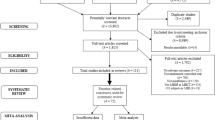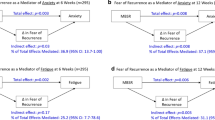Abstract
Purpose
Mindfulness-Based Stress Reduction (MBSR) is a well-known method for reducing stress and negative affect. Recently, a small, open-label trial showed that MBSR training was associated with a shift toward more positive responses to emotionally ambiguous signals (e.g., surprised expressions that convey either positive or negative meaning).
Methods
Here, we test whether the MBSR-induced shift in responses to emotional ambiguity reported previously is accompanied by a reduction in self-reported depression and anxiety symptoms (n = 42).
Results
In support of our hypothesis, we found that the degree to which individuals’ post-training responses to emotional ambiguity became more positive was associated with the degree of reduction in post-training depression and anxiety symptoms (i.e., post-training symptoms controlling for pre-training symptoms; ps = 0.001). Importantly, the effect remains significant even when accounting for increases in self-reported mindfulness.
Conclusions
Altogether, the results suggest that shifts in valence bias and reductions in internalizing symptoms track one another following MBSR, warranting future randomized, mechanistic investigations.

Similar content being viewed by others
Data and/or code availability
Data and/or code availability: Data cannot be shared publicly because the participants consented to the report of the data in terms of group means and not individualized data. The University of Nebraska-Lincoln Institutional Review Board completed review of the original research protocol including data sharing restrictions. Data requests can be sent to the current contracts manager in the Office of Sponsored Programs at University of Nebraska-Lincoln. All data sharing requests are first subject to a contract agreement through the Office of Sponsored Programs. Analysis code and stimuli lists are available on the Open Science Framework (https://osf.io/3n578/).
Notes
Consistent with our prior report using a slightly larger sample (Harp et al., 2022), two-tailed paired t-tests revealed no evidence of change in valence bias for session one vs. two (t(35) = 0.71, p = .48) and session three vs. four (t(30) = -0.82, p = .42).
References
Baer, R. A., Smith, G. T., Hopkins, J., Krietemeyer, J., & Toney, L. (2006). Using self-report assessment methods to explore facets of mindfulness. Assessment, 13(1), 27–45. https://doi.org/10.1177/1073191105283504
Beck, A. T. (1979). Cognitive therapy and the Emotional Disorders. Penguin.
Beck, A. T., Steer, R. A., & Brown, G. (1996). Beck Depression Inventory–II. https://doi.org/10.1037/t00742-000
Bishop, S. R., Lau, M., Shapiro, S., Carlson, L., Anderson, N. D., Carmody, J., Segal, Z. V., Abbey, S., Speca, M., Velting, D., & Devins, G. (2004). Mindfulness: A proposed operational definition. Clinical Psychology: Science and Practice, 11(3), 230–241. https://doi.org/10.1093/clipsy.bph077
Braunstein, L. M., Gross, J. J., & Ochsner, K. N. (2017). Explicit and implicit emotion regulation: A multi-level framework. Social Cognitive and Affective Neuroscience, 12(10), 1545–1557. https://doi.org/10.1093/scan/nsx096
Buhle, J. T., Silvers, J. A., Wager, T. D., Lopez, R., Onyemekwu, C., Kober, H., Weber, J., & Ochsner, K. N. (2014). Cognitive reappraisal of emotion: A Meta-analysis of human neuroimaging studies. Cerebral Cortex, 24(11), 2981–2990. https://doi.org/10.1093/cercor/bht154
Chiesa, A., Serretti, A., & Jakobsen, J. C. (2013). Mindfulness: Top–down or bottom–up emotion regulation strategy? Clinical Psychology Review, 33(1), 82–96. https://doi.org/10.1016/j.cpr.2012.10.006
Core Team, R. (2022). R (4.2.1). R Foundation for Statistical Computing. https://www.R-project.org/
Dawson, A. F., Brown, W. W., Anderson, J., Datta, B., Donald, J. N., Hong, K., Allan, S., Mole, T. B., Jones, P. B., & Galante, J. (2020). Mindfulness-based interventions for University students: A systematic review and Meta-analysis of Randomised controlled trials. Applied Psychology: Health and Well-Being, 12(2), 384–410. https://doi.org/10.1111/aphw.12188
Enkavi, A. Z., Eisenberg, I. W., Bissett, P. G., Mazza, G. L., MacKinnon, D. P., Marsch, L. A., & Poldrack, R. A. (2019). Large-scale analysis of test–retest reliabilities of self-regulation measures. Proceedings of the National Academy of Sciences, 116(12), 5472–5477. https://doi.org/10.1073/pnas.1818430116
Garland, E. L., Gaylord, S. A., & Fredrickson, B. L. (2011). Positive reappraisal mediates the stress-reductive effects of mindfulness: An upward spiral process. Mindfulness, 2, 59–67. https://doi.org/10.1007/s12671-011-0043-8
Goldberg, S. B., Tucker, R. P., Greene, P. A., Davidson, R. J., Wampold, B. E., Kearney, D. J., & Simpson, T. L. (2018). Mindfulness-based interventions for psychiatric disorders: A systematic review and meta-analysis. Clinical Psychology Review, 59, 52–60. https://doi.org/10.1016/j.cpr.2017.10.011
Harp, N. R., Brown, C. C., & Neta, M. (2021). Spring Break or Heart Break? Extending Valence Bias to emotional words. Social Psychological and Personality Science, 12(7), 1392–1401. https://doi.org/10.1177/1948550620972296
Harp, N. R., Freeman, J. B., & Neta, M. (2022). Mindfulness-based stress reduction triggers a long-term shift toward more positive appraisals of emotional ambiguity. Journal of Experimental Psychology General, 151(9), 2160–2172. https://doi.org/10.1037/xge0001173
Hirshberg, M. J., Goldberg, S. B., Schaefer, S. M., Flook, L., Findley, D., & Davidson, R. J. (2018). Divergent effects of brief contemplative practices in response to an acute stressor: A randomized controlled trial of brief breath awareness, loving-kindness, gratitude or an attention control practice. PLOS ONE, 13(12), e0207765. https://doi.org/10.1371/journal.pone.0207765
Hoge, E. A., Bui, E., Mete, M., Dutton, M. A., Baker, A. W., & Simon, N. M. (2023). Mindfulness-based stress reduction vs Escitalopram for the treatment of adults with anxiety Disorders: A Randomized Clinical Trial. JAMA Psychiatry, 80(1), 13–21. https://doi.org/10.1001/jamapsychiatry.2022.3679
Ito, T. A., Larsen, J. T., Smith, N. K., & Cacioppo, J. T. (1998). Negative information weighs more heavily on the brain: The negativity bias in evaluative categorizations. Journal of Personality and Social Psychology, 75, 887–900. https://doi.org/10.1037/0022-3514.75.4.887
Kabat-Zinn, J. (2013). Full catastrophe living (revised Edition): Using the Wisdom of your body and mind to face stress, Pain, and illness. Random House Publishing Group.
Kazdin, A. E. (2007). Mediators and mechanisms of change in Psychotherapy Research. Annual Review of Clinical Psychology, 3(1), 1–27. https://doi.org/10.1146/annurev.clinpsy.3.022806.091432
Khoo, E. L., Small, R., Cheng, W., Hatchard, T., Glynn, B., Rice, D. B., Skidmore, B., Kenny, S., Hutton, B., & Poulin, P. A. (2019). Comparative evaluation of group-based mindfulness-based stress reduction and cognitive behavioural therapy for the treatment and management of chronic pain: A systematic review and network meta-analysis. Evidence Based Mental Health, 22(1), 26–35. https://doi.org/10.1136/ebmental-2018-300062
Kiken, L. G., & Shook, N. J. (2011). Looking up: Mindfulness increases positive judgments and reduces negativity Bias. Social Psychological and Personality Science, 2(4), 425–431. https://doi.org/10.1177/1948550610396585
Kober, H., Buhle, J., Weber, J., Ochsner, K. N., & Wager, T. D. (2019). Let it be: Mindful acceptance down-regulates pain and negative emotion. Social Cognitive and Affective Neuroscience, 14(11), 1147–1158. https://doi.org/10.1093/scan/nsz104
Kral, T. R. A., Schuyler, B. S., Mumford, J. A., Rosenkranz, M. A., Lutz, A., & Davidson, R. J. (2018). Impact of short- and long-term mindfulness meditation training on amygdala reactivity to emotional stimuli. Neuroimage, 181, 301–313. https://doi.org/10.1016/j.neuroimage.2018.07.013
Lundqvist, D., Flykt, A., & Öhman, A. (1998). The Karolinska Directed Emotional Faces—KDEF, CD ROM. Karolinska Institutet. https://www.kdef.se/home/aboutKDEF.html
Macinko, J., & Upchurch, D. M. (2019). Factors Associated with the Use of Meditation, U.S. Adults 2017. Journal of Alternative and Complementary Medicine (New York, N.Y.), 25(9), 920–927. https://doi.org/10.1089/acm.2019.0206
MacLeod, C., & Mathews, A. (2012). Cognitive Bias modification approaches to anxiety. Annual Review of Clinical Psychology, 8(1), 189–217. https://doi.org/10.1146/annurev-clinpsy-032511-143052
Mrazek, A. J., Mrazek, M. D., Cherolini, C. M., Cloughesy, J. N., Cynman, D. J., Gougis, L. J., Landry, A. P., Reese, J. V., & Schooler, J. W. (2019). The future of mindfulness training is digital, and the future is now. Current Opinion in Psychology, 28, 81–86. https://doi.org/10.1016/j.copsyc.2018.11.012
Neta, M., & Brock, R. L. (2021). Social connectedness and negative affect uniquely explain individual differences in response to emotional ambiguity. Scientific Reports, 11(1), https://doi.org/10.1038/s41598-020-80471-2
Neta, M., Norris, C. J., & Whalen, P. J. (2009). Corrugator muscle responses are associated with individual differences in positivity-negativity bias. Emotion, 9(5), 640–648. https://doi.org/10.1037/a0016819
Neta, M., Harp, N. R., Tong, T. T., Clinchard, C. J., Brown, C. C., Gross, J. J., & Uusberg, A. (2022). Think again: The role of reappraisal in reducing negative valence bias. Cognition and Emotion, 0(0), 1–16. https://doi.org/10.1080/02699931.2022.2160698
Norris, C. J., Leaf, P. T., & Fenn, K. M. (2019). Negativity bias in false memory: Moderation by neuroticism after a delay. Cognition and Emotion, 33(4), 737–753. https://doi.org/10.1080/02699931.2018.1496068
Park, G., Vasey, M. W., Kim, G., Hu, D. D., & Thayer, J. F. (2016). Trait Anxiety Is Associated with Negative Interpretations When Resolving Valence Ambiguity of Surprised Faces. Frontiers in Psychology, 7. https://www.frontiersin.org/articles/https://doi.org/10.3389/fpsyg.2016.01164
Petro, N. M., Tong, T. T., Henley, D. J., & Neta, M. (2018). Individual differences in valence bias: FMRI evidence of the initial negativity hypothesis. Social Cognitive and Affective Neuroscience, 13(7), 687–698. https://doi.org/10.1093/scan/nsy049
Querstret, D., Morison, L., Dickinson, S., Cropley, M., & John, M. (2020). Mindfulness-based stress reduction and mindfulness-based cognitive therapy for psychological health and well-being in nonclinical samples: A systematic review and meta-analysis. International Journal of Stress Management, 27(4), 394–411. https://doi.org/10.1037/str0000165
Rosenkranz, M. A., Davidson, R. J., MacCoon, D. G., Sheridan, J. F., Kalin, N. H., & Lutz, A. (2013). A comparison of mindfulness-based stress reduction and an active control in modulation of neurogenic inflammation. Brain Behavior and Immunity, 27 C, 174–184. https://doi.org/10.1016/j.bbi.2012.10.013
Samuelsson, H., Jarnvik, K., Henningsson, H., Andersson, J., & Carlbring, P. (2012). The Umeå University database of facial expressions: A validation study. Journal of Medical Internet Research, 14(5), e136. https://doi.org/10.2196/jmir.2196
Spielberger, C., Gorsuch, R., Lushene, R., Vagg, P., & Jacobs, G. (1983). Manual for the State-Trait Anxiety Inventory (Form Y1 – Y2). In Palo Alto, CA: Consulting Psychologists Press; Vol. IV.
Tottenham, N., Tanaka, J. W., Leon, A. C., McCarry, T., Nurse, M., Hare, T. A., Marcus, D. J., Westerlund, A., Casey, B. J., & Nelson, C. (2009). The NimStim set of facial expressions: Judgments from untrained research participants. Psychiatry Research, 168(3), 242–249. https://doi.org/10.1016/j.psychres.2008.05.006
Watters, A. J., & Williams, L. M. (2011). Negative biases and risk for depression; integrating self-report and emotion task markers. Depression and Anxiety, 28(8), 703–718. https://doi.org/10.1002/da.20854
Acknowledgements
We thank Hedy Kober for constructive comments on an earlier draft of this manuscript. We also thank Catherine C. Brown for assistance contacting MBSR instructors, as well as Jonathan B. Freeman and his research team, especially Hayoung Woo and Benjamin Barnett, for assistance with data collection.
Funding
This work was supported by the National Institutes of Health (NIMH111640; PI: Maital Neta), National Institute on Drug Abuse (T32 DA022975; Trainee: Nicholas R. Harp), Nebraska Tobacco Settlement Biomedical Research Enhancement Funds, and University of Nebraska-Lincoln ENHANCE College of Arts & Sciences funds.
Author information
Authors and Affiliations
Contributions
Conceptualization: N. R. Harp, M. Neta, and R. J. R. Blair. Methodology: N. R. Harp and M. Neta. Formal Analysis: N. R. Harp. Investigation: N. R. Harp. Original Draft Preparation: N. R. Harp. Reviewing and Editing: N. R. Harp, M. Neta, and R. J. R. Blair.
Corresponding author
Ethics declarations
Competing Interests
The authors have no financial or non-financial interests to report.
Ethics Approval
All research protocols were approved by University of Nebraska-Lincoln’s Institutional Review Board (Approval #20171217871EP) and in accordance with the Declaration of Helsinki.
Informed Consent
All participants provided informed consent.
Additional information
Publisher’s Note
Springer Nature remains neutral with regard to jurisdictional claims in published maps and institutional affiliations.
Electronic Supplementary Material
Below is the link to the electronic supplementary material.
Rights and permissions
Springer Nature or its licensor (e.g. a society or other partner) holds exclusive rights to this article under a publishing agreement with the author(s) or other rightsholder(s); author self-archiving of the accepted manuscript version of this article is solely governed by the terms of such publishing agreement and applicable law.
About this article
Cite this article
Harp, N.R., Blair, R.J.R. & Neta, M. Shift in Valence Bias Associated with Decrease in Trait Anxiety and Depression Symptoms. Cogn Ther Res (2023). https://doi.org/10.1007/s10608-023-10437-x
Accepted:
Published:
DOI: https://doi.org/10.1007/s10608-023-10437-x




